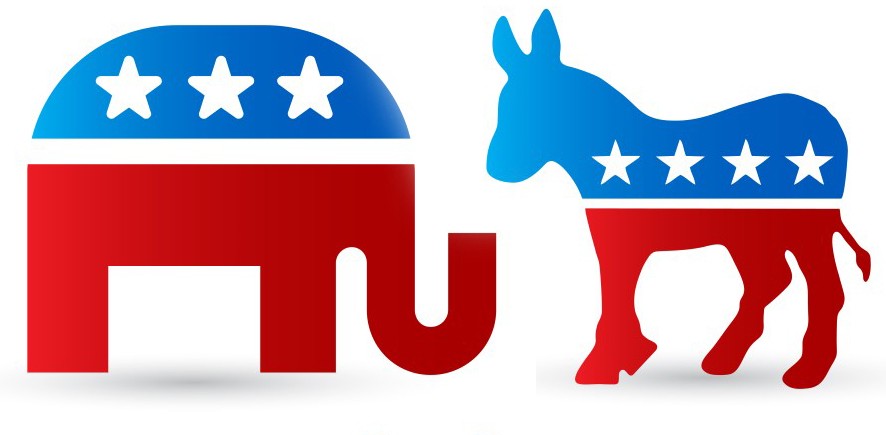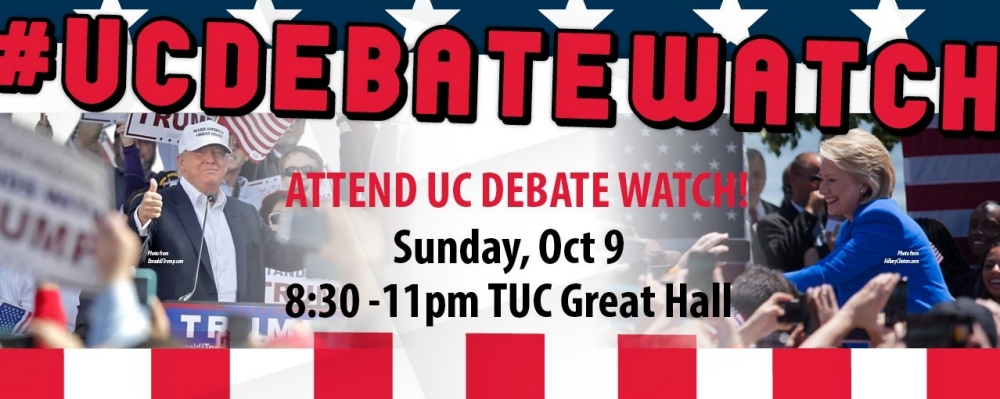UC to host presidential debate watch party
Don’t want to watch the presidential debate alone? Join hundreds
from the UC community Oct. 9 for a free nonpartisan pre-debate panel
discussion with political science experts, a televised viewing of the
debate and a post-debate Q&A session with UC faculty.
By Rachel Richardson
513-556-5219
Oct. 4, 2016
With five weeks to go until Election Day, the high-stakes presidential debates could be crucial in swaying voters who have yet to decide on their choice in what has been one of the most heated and polarized political matches in decades.
Following a fiery first debate, Democratic nominee Hillary Clinton and Republican Donald Trump will face off again Sunday, Oct. 9, at Washington University in St. Louis.
As the political rancor reaches a fever pitch, the University of Cincinnati aims to infuse civility and a nonpartisan perspective to the conversation with a Debate Watch party.
The event, which is free to attend and open to the public, features a pre-debate panel discussion with political science experts, a televised viewing of the live debate and a post-debate question-and-answer session with UC faculty.
“You can stay at home and watch the debate and get the partisan spin or come out and enjoy a civic event and be part of democracy at work,” said Richard Harknett, a UC political science professor and head of the political science department, which is sponsoring the event.
- Follow the UC Debate Watch online and ask questions at @UCDebateWatch. Be sure to use #UCDebateWatch in your comments. Are you a UC alum? Use #UCDWAlumni in your questions to receive a priority response!
This is the third Debate Watch party for the department, which is part of UC’s College of Arts and Sciences. A similar 2012 event between Democratic incumbent president Barack Obama and Republican nominee Mitt Romney drew nearly 600 people.
Many of the attendees are students, some of whom are voting for the first time in a presidential election, but Harknett says the crowd also includes others in the community who appreciate a spirited — but civil — discourse.
“We’re going to have a neutral panel of experts who look at this from the political science standpoint,” he said. “We don’t allow partisan speeches at the microphone. We’re going to learn what these two candidates are presenting to the country as a possible president.”
More than 80 million people — the largest audience in televised debate history — tuned in to the first Clinton-Trump debate on Sept. 26, in which the candidates clashed on issues of temperament, character and policies.
Harknett said the second debate could draw an even larger viewership.
“Traditionally, the second debate is the highest-rated debate,” he explained. “Somebody lost the first debate, so the narrative going into the second debate is if that person can recover or if the winner can seal the deal with the American population.”
But, he acknowledged with a laugh, “this has not been a traditional year.”
“There’s a lot of angst out there, and we’re at a high level of partisanship as American cycles go,” said Harknett. “This is an important public service that the university does.”

Illustration by Ibrandify - Freepik.com
IF YOU GO
The event, which takes place in the Great Hall of UC’s Tangeman University Center, begins with a panel discussion from 8:30-8:55 p.m. with UC political science faculty members David Niven, Rebecca Sanders and Rina Williams.
The panelists will provide a brief overview of the state of the national election, the importance of Ohio to both campaigns, international and foreign policy issues and the role of race, ethnicity and voting blocs in the election.
A social media survey of the audience also takes place at 8:30 p.m., with analysis provided by faculty members Stephen Mockabee and Jack Mewhirter.
The town hall-style debate will be screened between 9-10:30 p.m., with snacks and refreshments provided. Follow along and participate online with the hashtag #UCDebateWatch.
UC faculty will be tweeting comments and accepting questions at the account @UCDebateWatch. Are you a UC alum? Be sure to include #UCDWAlumni in your questions to receive a priority response!
Following the debate, another panel of experts will attempt to clarify positions taken by the candidates and changes to their platforms and discuss debate missteps while taking questions from the audience and via Twitter.
ABOUT THE PANELISTS

Richard Harknett, political science professor and head of UC’s Department of Political Science, specializes in international relations theory and security studies and cybersecurity. He serves on Ohio’s Cybersecurity Education and Economic Development Council by appointment of the state governor.

David Niven, assistant professor of political science, teaches American politics and conducts research on campaigns, political communication and death penalty policy. Niven is the author of several books, including “The Politics of Injustice: The Kennedys, The Freedom Rides and the Electoral Consequences of a Moral Compromise.” He previously served as a speechwriter for former Ohio Gov. Ted Strickland and former Maryland Gov. Martin O’Malley’s presidential campaign.

Rebecca Sanders, assistant professor of political science and an affiliate faculty member in Women, Gender, & Sexuality Studies, specializes in the intersectionality of international law and security and human rights. Her current research examines the role of legal and normative constraints in shaping post-9/11 American interrogation, detention and surveillance practices, along with research on the backlash against the international women’s rights agenda at the United Nations and beyond.

Rina Williams, assistant professor of political science and an affiliate faculty member in Women's, Gender & Sexuality Studies and Asian Studies, specializes in South Asian politics, women and gender issues, ethnicity and nationalism, religion and politics and politics of the developing nations. She is the author of the 2006 book “Postcolonial Politics and Personal Laws: Colonial Legal Legacies and the Indian State.” Her current research examines the role of women and gender in religion nationalism in Indian politics.

Laura Jenkins, associate professor of political science and an affiliate faculty member in Women's, Gender & Sexuality Studies and Asian Studies, researches issues of social justice policies in the culturally diverse democracies of India, Indonesia, South Africa and the U.S. She is the author of the book, “Identity and Identification in India: Defining the Disadvantaged” and was a Fulbright New Century Scholar in South Africa and India. Her work explores issues of religious freedom and conversion, affirmative action, anti-discrimination laws, religious family law systems and minority rights, among other areas.

Andrew Lewis, assistant professor of political science, researches issues involving legal advocacy, First Amendment law and the engagement of religious groups in the politics of law. He specializes in issues of church-state law in the U.S. and religion and politics, with a focus on evangelical political engagement.

Brian Calfano, assistant professor of political science and journalism, is a political reporter and producer for Nexstar Broadcasting Group and teaches experimental design, research methods and politics and the media. He researches issues related to marginalized groups, political information use, religion and politics and journalistic coverage of political events. He is the co-author of the book “God Talk: Experimenting with the Religious Causes of Public Opinion” and “A Matter of Discretion: The Political Behavior of Catholic Priests in the U.S. and Ireland.”

Kim Conger, assistant professor of international affairs, is a national expert on religious activists and interest groups in state level politics and the past president of the Religion and Politics Research Section of the American Political Science Association. Her research has been published in Political Research Quarterly, Perspectives on Politics, Politics and Religion, and State Politics and Policy Quarterly. Conger’s current research examines the role of interest groups in political party activism and conventions.
For more information, call the Department of Political Science at 513-556-3300.

